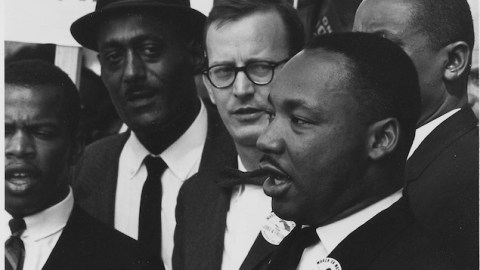Martin Luther King’s Labor Legacy

The Rev. Martin Luther King, Jr. was shot in Memphis forty-three years ago yesterday. Around the country, labor unions and civil rights held commemorative rallies protesting efforts in Wisconsin, Ohio, and elsewhere to strip public sector unions of their collective bargaining rights. On his show, Neil Cavuto said that unions had wasted little time to coopt King’s legacy. Cavuto guest Rev. Jesse Lee Peterson said that he believed King would turn over in his grave. “For Jesse Jackson and other to take his movement, to take his purpose, and use it for personal gain… is nothing less than evil.”
It may seem crass to claim the support of a hallowed figure like King for your cause more than 40 years after his death. But King was a political leader as much as a religious one, who fought, among other things, for labor rights—and whom the FBI suspected of being a communist. It might do more disservice to King’s memory to pretend he took no political sides than to remember what he fought for. As Digby reminds us, King was in Memphis the day he was shot in support of striking African American sanitation workers. The night before he was shot, in his famous “I’ve Been to the Mountaintop” speech, King explained that the issue that brought him there was “the refusal of Memphis to be fair and honest with its dealings with its public workers.”
For King, the right of workers to demand to be treat fairly was of a piece with the right of African Americans to be treated equally. Conservatives can admire King’s opposition to segregation and still disagree with his economic ideas. But it is wrong to forget that part of his legacy. As some Republicans try to make us forget the valuable role that labor movements have played in American history—to the point of going through the e-mails of a professor who wrote about that role—we shouldn’t forget that King fought for the rights of workers too.




